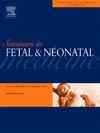Surfactant therapy - The conundrum of which infant should be given, when, which drug in what dose via which route of administration?
IF 2.9
3区 医学
Q1 PEDIATRICS
引用次数: 0
Abstract
Surfactant therapy in preterm and term born infants has been a huge success story. In the meantime, we have very detailed answers to the five essential questions of each medical therapy: which infant should be treated, when, with which drug, in/at what dose, and via which route of administration. The answers to these questions depend on the gestational age of the infant. We have focused on preterm infants <28 weeks of gestation as they are the most vulnerable and may have the maximum benefit of appropriate treatment. Therefore, we performed a sub-group analysis for data available from the published trials in infants less than 28 weeks who received less/minimal invasive surfactant administration/therapy [LISA/MIST] versus intubation-surfactant-extubation (INSURE). The need for mechanical ventilation (MV) was significantly reduced by 28 % (RR:0.72, 95%CI:0.64–0.80, n = 548 infants) after LISA/MIST. The incidence of bronchopulmonary dysplasia (BPD) was significantly decreased by 30 % (RR:0.70, 95%CI:0.66–0.75, n = 6528 infants) after LISA/MIST. No difference in mortality was noted between the two groups. In the current review, we discuss the applicability of guidelines to individual patient groups like the infants <28 weeks and emphasize the individual assessment of published data by the treating physician.
表面活性物质疗法--应该在什么时间、什么剂量、通过什么给药途径给哪个婴儿用药的难题?
早产儿和足月儿的表面活性物质疗法取得了巨大成功。与此同时,我们对每种医学疗法的五个基本问题都有了非常详细的答案:应在何时、用何种药物、以何种剂量、通过何种途径对哪种婴儿进行治疗。这些问题的答案取决于婴儿的胎龄。我们的重点是早产儿
本文章由计算机程序翻译,如有差异,请以英文原文为准。
求助全文
约1分钟内获得全文
求助全文
来源期刊
CiteScore
6.40
自引率
3.30%
发文量
49
审稿时长
6-12 weeks
期刊介绍:
Seminars in Fetal & Neonatal Medicine (formerly Seminars in Neonatology) is a bi-monthly journal which publishes topic-based issues, including current ''Hot Topics'' on the latest advances in fetal and neonatal medicine. The Journal is of interest to obstetricians and maternal-fetal medicine specialists.
The Journal commissions review-based content covering current clinical opinion on the care and treatment of the pregnant patient and the neonate and draws on the necessary specialist knowledge, including that of the pediatric pulmonologist, the pediatric infectious disease specialist, the surgeon, as well as the general pediatrician and obstetrician.
Each topic-based issue is edited by an authority in their field and contains 8-10 articles.
Seminars in Fetal & Neonatal Medicine provides:
• Coverage of major developments in neonatal care;
• Value to practising neonatologists, consultant and trainee pediatricians, obstetricians, midwives and fetal medicine specialists wishing to extend their knowledge in this field;
• Up-to-date information in an attractive and relevant format.

 求助内容:
求助内容: 应助结果提醒方式:
应助结果提醒方式:


